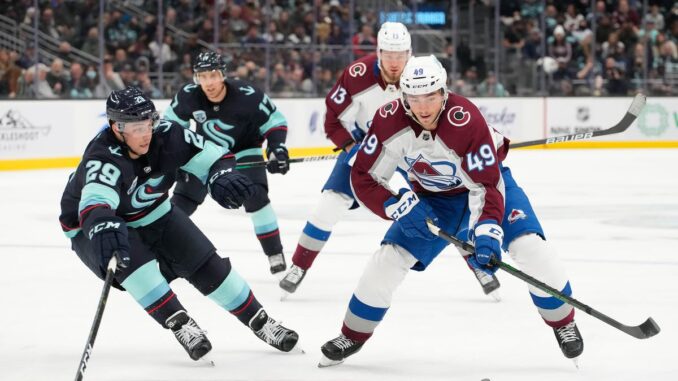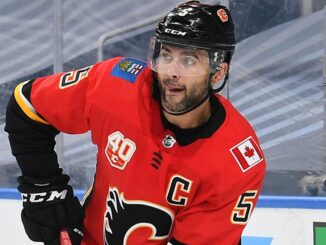
After yet another grueling 82-game season, the 2023 NHL Playoffs are finally upon us. After qualifying for the postseason as the Western Conference’s top wildcard team, the Seattle Kraken are set to make their postseason debut as a franchise.
Related: How The Seattle Kraken Qualified For The 2023 NHL Playoffs
What is the organization’s reward for the greatest second-season turnaround by an expansion team in NHL history? The reigning Stanley Cup champion Colorado Avalanche, who played at a .723 points percentage (PTS%) clip since the start of 2023, represents the third-best mark over that span.
All is not lost for the Kraken, given the randomness inherent to hockey. A look at each team’s strengths and weaknesses can give us an idea of how Dave Hakstol’s men can emerge victorious and which players will play critical roles in determining the outcome of the series – let’s dive in.
Forwards: Kraken’s Depth vs. Avalanche’s Star Power
Let’s not beat around the bush – the Avalanche are loaded with talent up front, even with captain Gabriel Landeskog recently being ruled out for the entire postseason.
In Nathan MacKinnon (42 goals, 111 points) and Mikko Rantanen (55 goals, 105 points), the Avalanche boast two of the NHL’s top 10 leading scorers. Only Connor McDavid (64) and David Pastrnak (61) scored more goals than Rantanen.
By points per game, MacKinnon ranked third (1.58) behind only McDavid and Leon Draisaitl and led the NHL in even-strength scoring (77 points) despite missing seven or more games than the rest of those in the top 10.
Beyond that dynamic duo, the Avalanche can throw out forechecking demons in Valeri Nichushkin and Artturi Lehkonen, who scored at 73- and 66-point paces, respectively. The pair struggled to stay healthy this season, but both were pivotal in Colorado’s Cup run.
Mix in Evan Rodrigues and J.T. Compher, who stepped up at times this season with the top stars, and the Avalanche’s forward group still looks dangerous despite injuries and notable offseason departures (Nazem Kadri and Andre Burakovsky).
For the Kraken, their offensive production has come through a committee approach. Although Jared McCann was one of only 19 skaters to eclipse 40 goals on the season, his 70 points are one of the lowest team-leading totals in the league. He ranks 30th in goals scored over the past two seasons, but it’d be a stretch to classify him as a surefire sniper.
Even so, six Kraken forwards scored 20 or more goals, and another two (Eeli Tolvanen and Burakovsky) would have hit the benchmark had they played an entire season.
Burakovsky’s absence looms large as he is a key component of the Kraken’s neutral zone strategy, often using his speed and puck-carrying to back up aggressive defenders. He may return in Round One if the series goes long, but it may be too late.
Fourth-line dynamo Daniel Sprong could be a key figure capable of changing the momentum in-depth minutes. The 26-year-old winger ranks eighth in goals per-60-minutes and third in points per-60-minutes at 5-on-5 among qualified forwards, despite averaging just over nine such minutes per game.
If the Avalanche’s stars exert their will over play, it could be a short series. The Kraken do hold an advantage further down the lineup, so winning those minutes will be vital to extending this first-round bout.
Advantage: Avalanche
Defensemen: Avalanche’s Dynamic Trio vs. Kraken’s Underrated Blueline
The Avalanche blueline triumvirate consisting of reigning Norris Trophy winner Cale Makar, the underrated Devon Toews, and burgeoning star Bowen Byram is nearly unmatched in the NHL.
Makar and Toews are aggressive puck-movers capable of generating zone exits with their skating, even under extreme pressure. Although Toews doesn’t possess the same physical gifts, his hockey sense and crisp first pass more than makeup for that fact.
Elsewhere, Josh Manson and Samuel Girard round out arguably the league’s best defense corps, bringing their brand of physicality (Manson) and fluidity (Girard). The Avalanche defend by keeping the puck away from their opponents (second in 5-on-5 scoring chances against per-60), and the Kraken will be in tough to retain the puck for extended periods.
Related: Kraken’s Dunn Enjoying Dark Horse Norris Trophy Season
The Kraken’s Vince Dunn has a Stanley Cup on his resume but won while playing in a depth role. His offensive emergence this season bodes well for the future. Still, the rest of the Kraken blueline lacks the mobility and puck-handling required to evade the Avalanche’s ferocious forecheck and subtly grinding style in the offensive zone.
Beyond the Kraken’s top pair of Dunn and Adam Larsson (the most frequently used pairing in the NHL this season), there is some uncertainty on the back end.
Although all six of the Kraken’s regular defenders posted a 5-on-5 expected goals share of 49% or greater according to Natural Stat Trick, Will Borgen and Justin Schultz could be targeted by Avalanche head coach Jared Bednar. They give up the highest rate of high-danger chances of the Kraken blueliners, with Schultz both called for infractions and allowing zone entries at the second-highest rate on the team.
As a complete unit, the Kraken are a staunch defensive group at 5-on-5, but a few weaker defenders could be isolated, especially when the Avalanche have last change at home. Speed is punishing, and the Kraken won’t have any room for error.
Advantage: Avalanche
Goaltending: Inexperienced Georgiev vs. Inconsistent Grubauer
More than any other aspect of this matchup, goaltending will be the most significant determinant of which team advances to Round Two.
Since coming over from the New York Rangers in a trade last summer, Avalanche netminder Alexandar Georgiev has quietly been one of the league’s best in the crease. Considering there were many questions about his durability and ability, his performance this season has been a welcome surprise.
If nothing else, it appears as though the Avalanche made the right choice moving on from the now-Kraken starter Philipp Grubauer after the 2019 Playoffs, acquiring Darcy Kuemper, and now turning to Georgiev. Here are their 2022-23 statistics, with NHL rank among qualified goalies (minimum ten games played) in parentheses:
| Georgiev (Rank) | Statistic | Grubauer (Rank) |
| 62 (3rd) | Games Played | 39 (30th) |
| .919 (10th) | Save Percentage (SV%) | .895 (56th) |
| 2.53 (16th) | Goals-Against Average (GAA) | 2.85 (29th) |
| .852 (10th) | High-Danger SV% | .801 (57th) |
| 0.35 (14th) | Goals Saved Above Expected (GSAx) Per-60 | -0.02 (41st) |
Clearly, there’s a bit of a talent discrepancy in the crease. Although Grubauer has played behind one of the best 5-on-5 team defenses, his raw and quality-adjusted numbers grade out at an average or below-average level.
Grubauer’s inconsistency is a continuation of last season’s struggles, where he contributed to the Kraken’s league-worst team SV% in all situations. The Kraken improved to third-worst in 2022-23, but that’s of little solace when the likes of MacKinnon, Rantanen, and Makar are coming to town.
Veteran Martin Jones steadied the Kraken crease early on when Grubauer missed time due to injury, but his metrics are even worse.
Since February 1st, Grubauer made 20 starts to Jones’ 10, and 13 to 5 after the trade deadline, so Hakstol’s preferred choice seems to be clear. Like most postseason underdogs, the Kraken will have to hope that the percentage gods smile upon them in minimal sample size and the Avalanche suddenly forget how to finish their chances.
Although the roster battle is more even out of the net, the goaltender is easily the most significant factor in the outcome. If regular-season trends continue, this series could be over in a hurry.
Advantage: Avalanche
Special Teams: Avalanche Power Play vs. Kraken Penalty Kill
When it comes to the special teams’ battle, the Kraken could find themselves in a deep hole if they run into penalty trouble.
The Kraken are a disciplined group (13th-fewest minor penalties taken), but the Avalanche have found success with antagonizing the opposition, drawing the 12th-most minor penalties in the league.
Seattle was only whistled for infractions at about a league-average rate, and not having Burakovksy’s speed hurts. However, Matty Beniers and Brandon Tanev are both within the top 100 of all forwards in penalties drawn per-60 over the past two seasons.
| Avalanche (Rank) | Statistic | Kraken (Rank) |
| 24.5 (6th) | Powerplay (PP) % | 19.8 (21st) |
| 7.97 (16th) | PP xGF/60 | 6.78 (26th) |
| 8.78 (6th) | PP GF/60 | 6.97 (21st) |
| 79 (17th) | Penalty Kill (PK) % | 76.7 (21st) |
| 8 (18th) | PK xGA/60 | 7.35 (9th) |
| 7.57 (15th) | PK GA/60 | 8.48 (19th) |
Given that the Avalanche boast some of the NHL’s top scorers, their power play is one of the most prolific in the league. They rank sixth in both raw conversion and scoring rates, even though they don’t generate chance quality at a particularly elite rate. Finishing talent can help overcome mediocre chance generation, and the Avalanche are Exhibit A for that phenomenon.
In a surprising twist, the Kraken’s bottom-third penalty kill is one of the most effective units at suppressing opposing scoring chances. It’s the team’s goaltending – well explored in the previous section – which hasn’t performed at the same high level, ranking 27th in team SV% while shorthanded.
On the other side of the puck, the Avalanche’s penalty kill isn’t a clear weakness, and they have the goaltending to cover up for any miscues. The Kraken’s inability to create chances with the man-advantage (26th by expected goals per-60) and lack of star talent up front tilts the special teams’ conflict into Colorado’s favor.
Advantage: Avalanche
NHL Experts Heavily Favoring the Avalanche
In an unexpected development, a vast majority of the hockey world’s top prognosticators and scribes are betting on the reigning Stanley Cup champions to win the series without too much trouble.
| Model/Outlet | Avalanche | Kraken |
| MoneyPuck | 67% | 33% |
| FiveThirtyEight | 83% | 17% |
| Dom Luszczyszyn (The Athletic) | 77% | 23% |
| Evolving Hockey | 62% | 38% |
| The Athletic (Writers’ Vote) | 100% | 0% |
| ESPN (Writers’ Vote) | 96% | 4% |
| NHL.com (Writers’ Vote) | 100% | 0% |
Given the Avalanche just won the Cup a year ago and retained the main pieces of their title-winning core, the relative inexperience throughout the Kraken lineup is a clear weak point heading into the franchise’s first playoff appearance.
The Kraken’s balanced approach and success on the road will serve them well and keep the series competitive, but they lack the star power required to go deep into the postseason.
Marko’s Prediction: Avalanche win the series 4-1
Data courtesy of AllThreeZones, Evolving Hockey, MoneyPuck, Natural Stat Trick, and the NHL.




